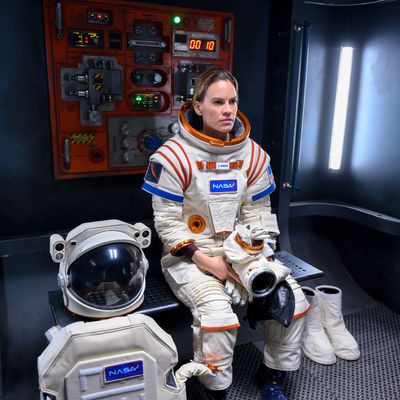
When it comes to space-focused television, there is no such thing as a final frontier. Such series have always existed but have been especially omnipresent lately thanks to Avenue 5, Space Force, Star Trek: Picard, Star Trek: Lower Decks, The Expanse, The Orville, the remake of Lost in Space, and probably a few more I am forgetting.
Add another one to the list because Friday marks the debut of Away, the Netflix drama starring Hilary Swank as Emma Green, the captain of an international, NASA-supported mission to Mars. The action in Away is split between the Atlas, the ship carrying a five-person crew on its historic trip to the Red Planet; what’s happening back on Earth, particularly with Emma’s husband, Matt (Josh Charles), and their teenage daughter, Lexi (Talitha Bateman); and Lost-esque flashbacks that reveal more about the personal histories of the astronauts on the Atlas. It’s an approach that mirrors the spirit of Casey Kasem’s old “American Top 40” catchphrase: “Keep your feet on the ground and keep reaching for the stars.”
Away doesn’t possess quite the same level of energy as a countdown of pop songs, though. Even in its more intense moments — and there are certainly some fraught ones, both out in space and on our home planet — there’s a calmness that pervades the entire series. In some scenes and episodes, that can be an asset. All the white noise and graceful zero-gravity gliding through the ship’s interior can be pleasantly peaceful and, especially in a heartfelt holiday episode in which Christmas lights add an extra glow to the environment, really lovely to watch. The problem is that even when Emma and her colleagues face serious dangers, like fires and damaged water-supply systems, the stakes never feel as high as they should. Away is a TV show. It’s also a form of melatonin.
Executive produced by, among others, Jason Katims; created by Andrew Hinderaker, who previously wrote for Katims’s Pure Genius; and overseen by showrunner Jessica Goldberg, creator of The Path, another Katims production, Away has the sort of heart that defines other Katims projects like Friday Night Lights and Parenthood. It is committed to capturing the struggles that decent, determined people face and finding the good in every single soul it portrays. That can be a refreshing thing to witness — particularly in “this climate” — but striking the appropriate sentimental balance is tricky. Sometimes Away gets it right, and sometimes it’s overly saturated in space schmaltz.
As the series begins, Emma is embarking on the historic mission she has been training for her entire life. She’s joined by fellow astronauts Misha Popov (Mark Ivanir) of Russia, Lu Wang (Vivian Wu) of China, Dr. Kwesi Weisberg-Abban (Ato Essandoh), a Ghanaian native representing the U.K., and second-in-command Ram Arya (Ray Panthaki) of India, all of whom alternately argue and bond throughout their odyssey.
Not long after the Atlas departs, Matt, a NASA engineer with CCM, or cerebral cavernous malformation, has a stroke brought on by the condition. He’s hospitalized for an extended period and — minor spoiler alert — learns pretty quickly that he’s paralyzed from the waist down. That puts Lexi in the position of part-time caretaker and teenager who feels abandoned by her mother, and Emma in a state of constant worry about them both.
Away spends a lot of time focusing on the Greens, tracking their delayed texts and the content of recorded voice messages and teary-eyed conversations, sometimes real, sometimes imagined, as the dynamics between them shift. Because of this, the series feels far more like a family drama than a sci-fi epic. (For the record, while the depiction of space here may not rise to the level of a movie like Gravity, the effects and production design are impressive and make life on a spacecraft feel viscerally real.) It’s in that family-drama context that Away hits its most predictable beats. Potential conflicts and plot twists can often be spotted miles away: The number of times we hear Emma or Matt say “I miss you” becomes exhausting, which, admittedly, may be less of a problem for those who opt to spread out their viewing rather than binge-watch.
The episodes get more interesting when the focus shifts to the supporting players. We discover that Lu harbors a secret that confirms there’s much more going on beneath her seemingly no-nonsense surface than first appears, while Kwesi, the crew’s botanist, reveals a spiritual side that belies his faith in science. These revelations add layers of skin to these characters’ initially bare bones and give the overall narrative more depth.
Every one of the principal players, including Swank and Charles, delivers a solid, invested performance. But even when they’re dealing with incredibly raw emotion, there’s something about the vibe of Away that makes even that seem a bit controlled. There are too many times when the storytelling choices are too on the nose, as when Elton John’s “Rocket Man” is invoked or the question “How does one become a space botanist?” inevitably tees up a flashback sequence. In its action sequences and illumination of the complexities involved in NASA operations, Away reminds us, again and again, that getting to another planet is riddled with risks. Yet as a series, it too frequently decides to play it safe.


